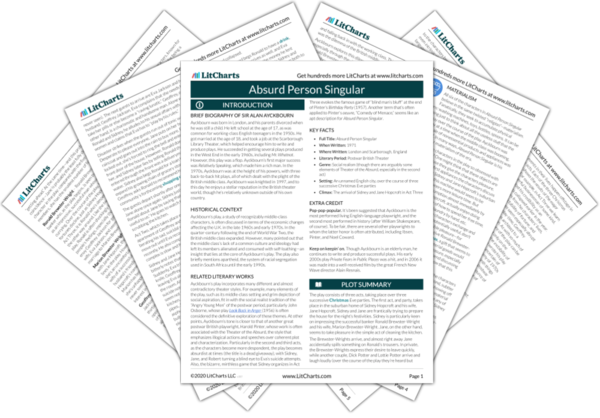One of the most puzzling things about Absurd Person Singular is the way that the characters’ fortunes—both their economic status and their overall luck in life—keep going up and down for no discernible reason. In only two years, Ronald Brewster-Wright—who was introduced as a successful, impressive middle-aged banker—falls on hard times, to the point where he’s relieved simply because his bank isn’t “in the red.” Another character, Eva Jackson, goes from being socially functional to being actively suicidal to being, for all intents and purposes, the most confident, secure character in the play. To name one more example, Sidney Hopcroft goes from being a pathetic, financially insecure businessman to being, it would seem, one of the most successful people in his community—and yet it’s never clear what he does or why he’s been successful. The characters’ happiness, confidence, and economic status are constantly rising or falling, but Ayckbourn gives little to no indication of why. Their fortunes would seem to be beyond their own control.
One reason the characters’ shifting fortunes can be puzzling is that the most significant events in their lives happen offstage in between each of the three acts. Each of the three Christmas parties depicted in the play shows the results of the major events of the previous year. For example, in Act Three we learn that Sidney has become a powerful businessman of some kind, and that Geoffrey Jackson has lost his credibility as an architect after one of his buildings collapsed earlier in the year. By depicting only three brief scenes from his characters’ lives, Ayckbourn emphasizes the unpredictability of fortune, and makes the shifts in the characters’ lives seem especially abrupt and shocking. In just a few minutes of play-time, Geoffrey Jackson goes from a confident, ambitious architect to a disillusioned, prematurely weary has-been. As with so much of Absurd Person Singular, this structural feature of the play can be interpreted as Ayckbourn’s commentary not only on the unpredictability of life in general, but also on the instability of the mid-seventies English economy. Ayckbourn wrote his play at a time when millions of English citizens were uncertain of their job security and financial stability. The economy of 1970s England was unpredictable and ambiguous: one month things seemed rosy, and the next month it seemed that the postwar boom was finally coming to an end. By obscuring the source of the characters’ fortunes, Ayckbourn captures this sense of unpredictability.
Moving away from economics, Absurd Person Singular’s portrayal of fortune makes the play’s tone difficult to interpret, since it’s difficult to decide how much to sympathize with the characters. In many ways, the play is tragic: the characters suffer from depression, alcoholism, and runaway ambition, all familiar tragic themes. And yet, in the typical tragedy, the characters’ own qualities bring about their success and then their downfall—King Oedipus’ thirst for knowledge causes his suffering. Not so in Absurd Person Singular: Geoffrey Jackson is arrogant and charismatic, but these qualities seem to have nothing to do with his failed career. He doesn’t bring about his failure—instead, failure just “happens” to him. The same could be said for any of the other characters in the play: Ayckbourn depicts them as puppets, passive victims of fortune. Sometimes they’re sympathetic, sometimes merely pathetic. By depicting fortune in this unconventional way, Ayckbourn could be said to create a hybrid genre, somewhere between the gritty realism of John Osborne and the menacing absurdism of Harold Pinter (both major English playwrights of the generation preceding Ayckbourn’s). Ayckbourn, like Osborne, is clearly attuned to the economic and political realities of his time, and he depicts the lives of ordinary, suffering English people. And yet, rather like Pinter, Ayckbourn doesn’t lose sight of the fact that these ordinary people are sometimes, in spite of their suffering, laugh-out-loud funny.
Fortune ThemeTracker

Fortune Quotes in Absurd Person Singular
MARION: Oh, that's lovely. Just that teeny bit stronger. You know what I mean. Not too much tonic . . .
SIDNEY: No, well . . .
MARION: Perfect.
SIDNEY: Actually, that's neat gin, that is.
MARION: This really is a simply loathsome little house. I mean how can people live in them. I mean, Geoff, you're an architect, you must be able to tell me. How do people come to design these sort of monstrosities in the first place, let alone persuade people to live in them?
GEOFFREY: Well...
MARION: Oh, God. Now he's going to tell me he designed it.
GEOFFREY: No. I didn't do it. They're designed like this mainly because of cost and people who are desperate for somewhere to live aren't particularly choosey.
SIDNEY: These people just weren't anybody. They are people in the future who can be very, very useful to us...
GEOFFREY: Yes, I know. You’re very anxious, aren't you, that I should go and work for the up and coming Mr. Hopcroft? So is up and coming Mr. Hopcroft.
JANE: I must clean that oven if it kills me.
RONALD: Had a good year. Must be pretty pleased.
SIDNEY: Oh, yes. Had a few lucky hunches. Seemed to pay off.
SIDNEY: Don't do that! Don't do that! It's too late for that. Look at this shirt. This is a new shirt.
EVA: Darling, I hate to remind you but ever since the ceiling of the Harrison building caved in and nearly killed the Manager, Sidney Hopcroft is about your only hope of surviving as an architect in this city.
SIDNEY: Yes. Up at Walter's place. Walter Harrison.
RONALD: Oh—old Harrison's.
SIDNEY: Oh of course, you'll know him, won't you.
RONALD: Oh, yes.
GEOFFREY: Yes.
SIDNEY: Oh, yes, of course. Asking you if you know old Harrison. I should think you do know old Harrison. He certainly remembers you. In fact he was saying this evening...
SIDNEY: That's it. Dance. Come on. Dance. Dance. Come on. Dance. Dance. Dance. Keep dancing. Dance . . .











